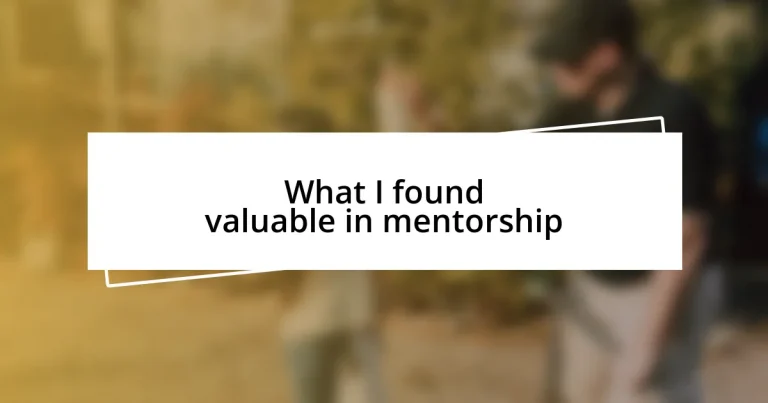Key takeaways:
- Mentorship is a transformative relationship built on trust, support, and shared growth experiences.
- Finding the right mentor involves aligning values, ensuring effective communication, and setting clear, achievable goals together.
- Constructive feedback and open dialogue are crucial for fostering growth and deepening the mentorship connection.
- Self-reflection and vulnerability are essential for personal growth and enhancing the mentorship experience over time.
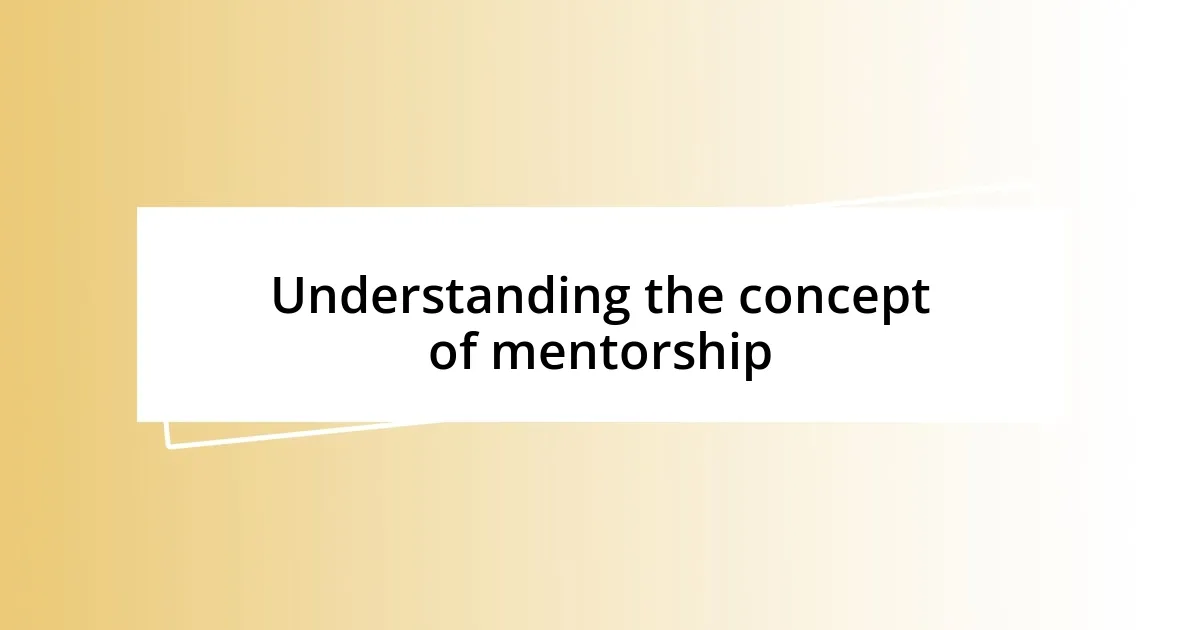
Understanding the concept of mentorship
Mentorship, at its core, is a relationship built on trust and growth. When I first started my career, I was fortunate to have a mentor who not only guided me through the complexities of my chosen field but also encouraged me to explore my strengths. The connection was more than just advice; it was a two-way street where I felt supported and valued.
As I reflect on my experiences, I realize that mentorship can often be transformative. Have you ever found yourself at a crossroads, unsure of your next step? I remember doubting my capabilities before a significant presentation, but my mentor’s belief in me empowered me to overcome my fears. This kind of encouragement can shift our perspectives and open doors we never knew existed.
The beauty of mentorship lies not just in the knowledge shared but in the relationship forged. It’s about finding someone who sees potential in you and is willing to invest their time. Think about the mentors in your life – what lessons did they impart that still resonate with you today? Their insights can serve as guiding lights along your personal and professional journey.
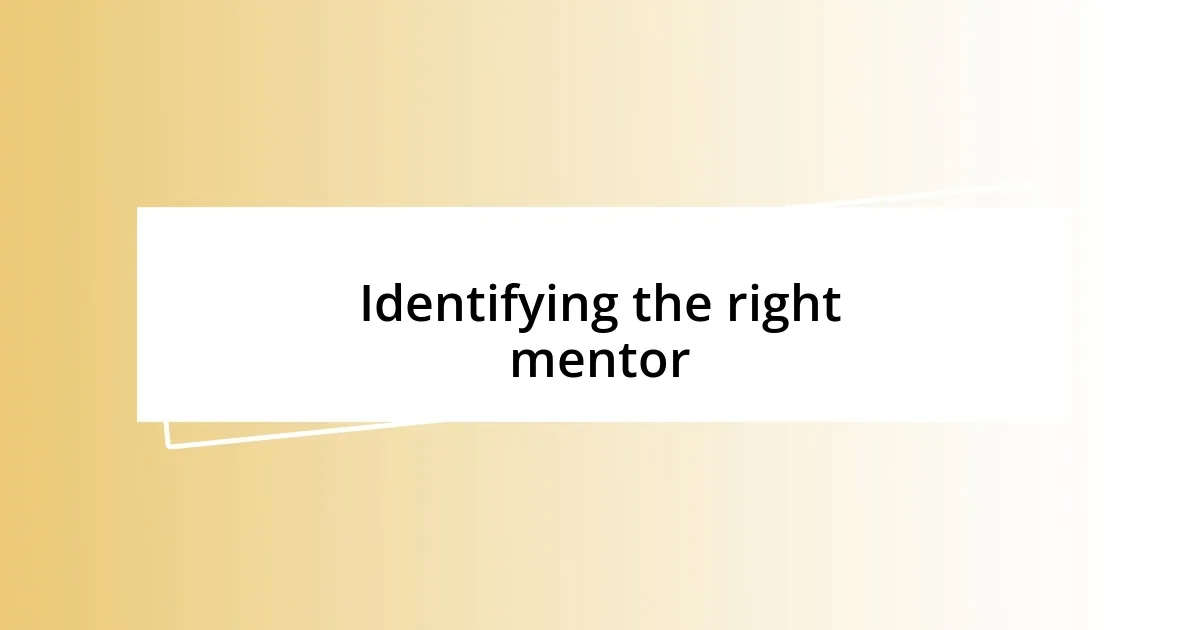
Identifying the right mentor
When searching for the right mentor, it’s essential to identify someone who aligns with your values and career aspirations. I remember looking for guidance when transitioning to a leadership role; I specifically sought out mentors who had successfully navigated similar paths. It was crucial for me to connect with someone whose experiences resonated with my own goals and challenges.
To help in your search, consider these key factors:
- Expertise and Experience: Look for someone with a strong background in your field or area of interest, as their insights will be invaluable.
- Chemistry and Trust: A mentor should make you feel comfortable sharing your thoughts and vulnerabilities; this trust fosters a productive relationship.
- Communication Style: Ensure their way of communicating aligns with how you prefer to engage. A mentor’s ability to listen and provide feedback in a way that resonates with you is vital.
- Availability: Choose someone who is genuinely invested in mentoring and has the time to commit to your development.
- Shared Values: Mentoring is more fruitful when both parties share similar values, as this can build a deeper, more meaningful connection.
Finding the right mentor takes time and reflection, but it’s a journey worth embarking on for your personal growth.
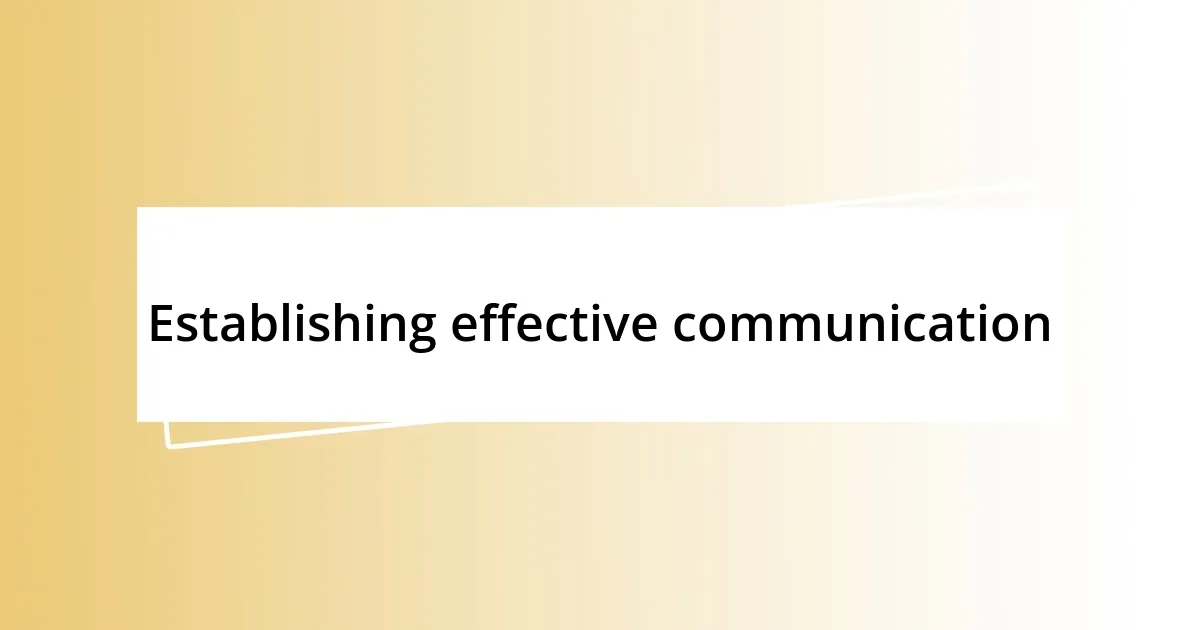
Establishing effective communication
Establishing effective communication is truly the backbone of a successful mentorship. I can’t stress how important it was for me to develop open dialogues with my mentor. I remember instances when I hesitated to share my struggles, thinking they’d see me as incompetent. But once I took that leap, our conversations deepened, leading to breakthroughs I never anticipated.
One aspect that stands out to me is feedback. Constructive feedback, when delivered with kindness, is a gift. One day, after a particularly rough meeting, I expressed my frustration, and my mentor offered a perspective that shifted my thinking completely. They didn’t just highlight my areas for improvement; they recognized my strengths, which reignited my confidence. This experience taught me the value of balanced communication – it’s not merely about critiquing, but recognizing potential too.
Trust is also essential for effective communication in mentorship. Have you ever felt vulnerable while discussing your ambitions or challenges? I remember feeling exposed when I shared my desire to start a new project that seemed daunting. My mentor not only listened but shared their own moments of doubt, which created a safe space for dialogue. This mutual understanding strengthened our relationship and fostered candid discussions about both my fears and aspirations.
| Type of Communication | Importance |
|---|---|
| Open Dialogue | Encourages honesty and vulnerability |
| Constructive Feedback | Paves the way for growth and confidence |
| Trust | Builds a nurturing mentorship environment |
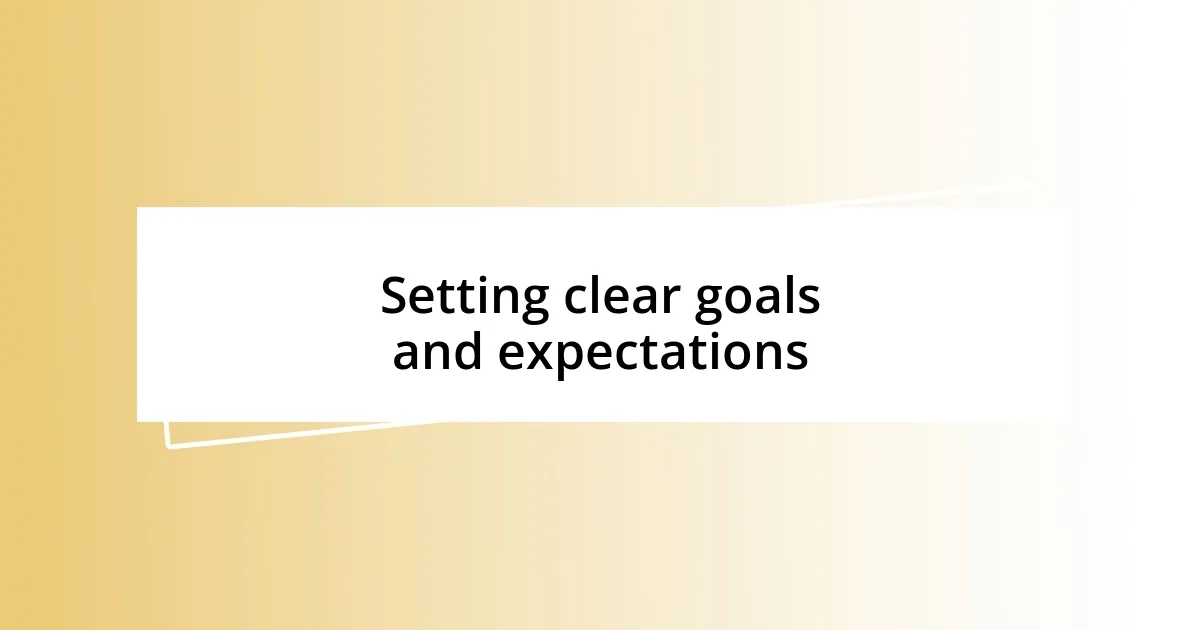
Setting clear goals and expectations
Setting clear goals and expectations is a game-changer in mentorship. I vividly recall my first meeting with my mentor, where we laid out specific objectives for our time together. It felt empowering to have a roadmap, something to strive for rather than wandering aimlessly. Have you ever felt lost in your journey? Defining those milestones helped ground me, providing direction during moments of uncertainty.
Another key aspect is the importance of alignment between your goals and your mentor’s expectations. During my mentorship, I learned that not all goals need to be grand; sometimes, small, achievable targets can lead to significant growth. For example, one of my goals was simply to improve my public speaking skills. By breaking it down into actionable steps, I found myself more focused and motivated. I often wondered, “Could I really become a better speaker?” With each small success, I realized that progress was indeed possible.
In my experience, revisiting and adjusting these goals regularly is equally important. Early on, my mentor reminded me that flexibility in our objectives allowed for continuous learning. When I faced unexpected challenges in a project, we reevaluated my milestones together, which helped me stay on course. It’s a reminder that mentorship isn’t just about the finish line; it’s about evolving as you navigate your path. How often do we allow ourselves the grace to adapt? Embracing this dynamic approach not only nurtured my growth but also deepened the trust in my mentorship relationship.
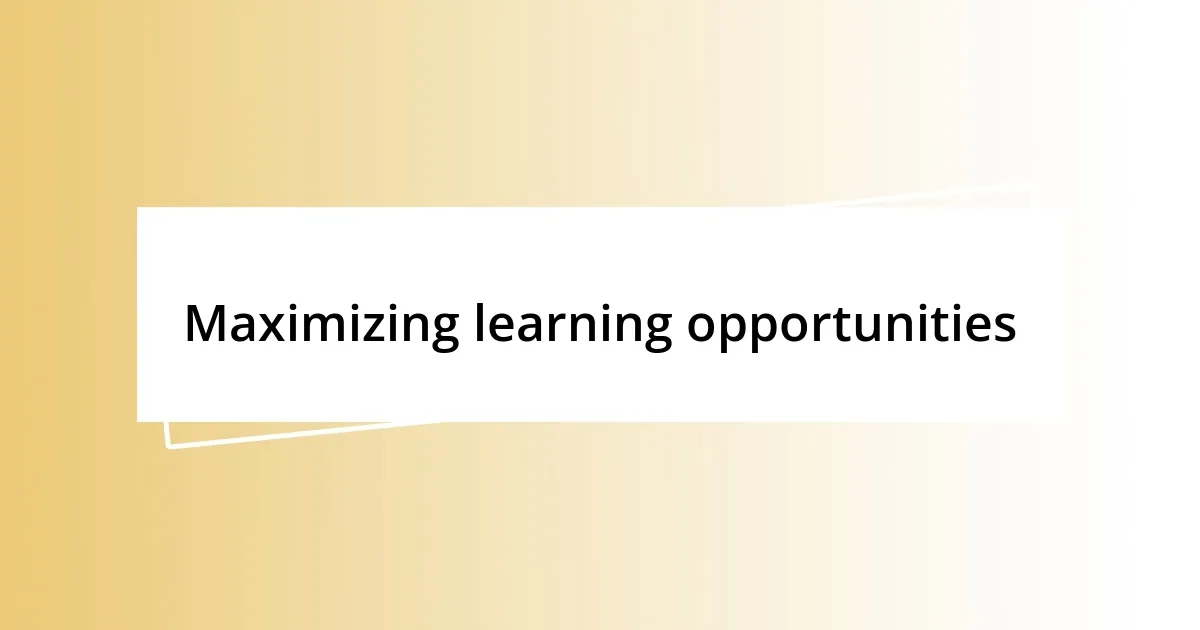
Maximizing learning opportunities
Maximizing learning opportunities is something I’ve always regarded as essential in mentorship. I remember a time when my mentor introduced me to a variety of resources—books, podcasts, and online courses—that enriched my understanding of our discussions. It was like unlocking a treasure chest of knowledge, and I often ask myself how much I might have missed without that guidance. Have you ever stumbled upon a resource that completely transformed your perspective?
Another pivotal moment for me was engaging in real-world projects together with my mentor. We tackled challenges that pushed me outside my comfort zone, which accelerated my learning in ways I could hardly have anticipated. I distinctly recall working on a project where I had to present to stakeholders. It felt daunting at first, but my mentor was by my side, providing insights and strategies. That experience taught me that the best learning often comes from practice and direct involvement rather than merely consuming information.
Additionally, I discovered the power of asking questions throughout my mentorship. I recall sitting with my mentor, curious about their career path, and learning so much more than I expected. Each inquiry not only deepened my understanding but also encouraged my mentor to share personal stories that provided context and relevance. It was through those conversations that I realized: sometimes, it’s the simplest questions that unlock the most profound insights. Have you taken the time to ask your mentor the right questions lately? It could lead to unexpected and invaluable lessons.
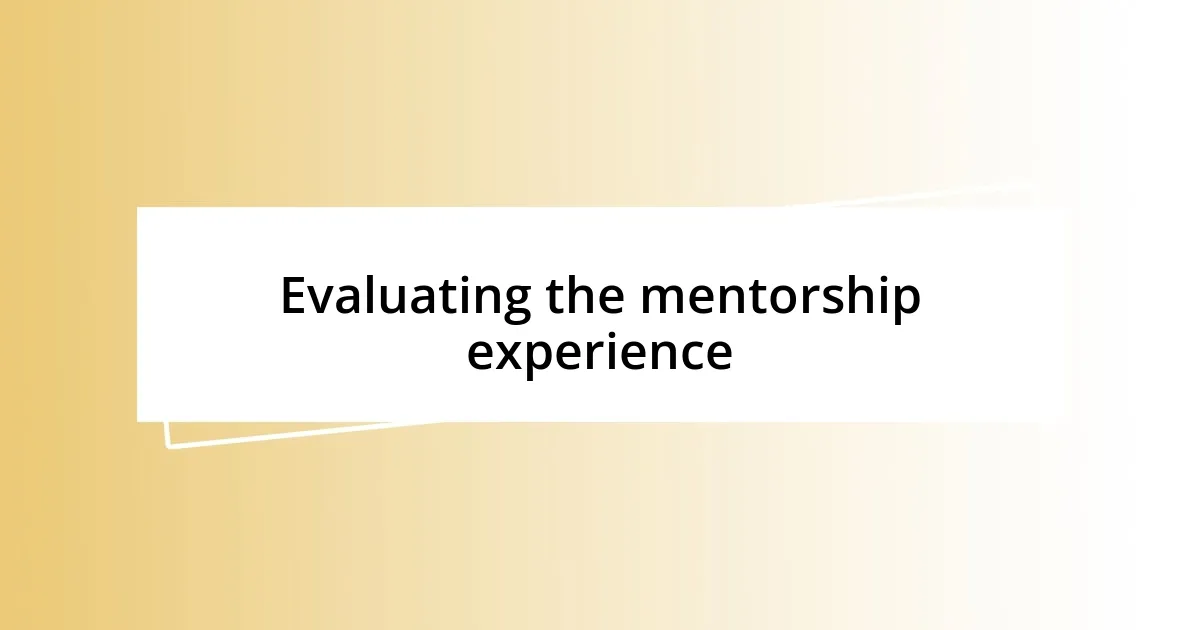
Evaluating the mentorship experience
Evaluating the mentorship experience is an essential step in understanding its impact on your growth. I remember feeling a mix of excitement and apprehension as I sat down with my mentor for our final review. It was an eye-opening moment when we discussed not just what I had achieved but also how I had transformed as a person. Reflecting on the journey helped me recognize areas I had grown in confidence and capability. Have you taken the time to reflect on your growth during mentorship?
One of the most surprising insights for me was how feedback shaped my experience. At first, I dreaded receiving criticism, but I learned to welcome it as a vital part of the process. There was a moment when my mentor pointed out a recurring flaw in my presentations. Initially, I felt defensive, but upon reflection, I realized this was a golden opportunity for improvement. How often do we allow ourselves to be vulnerable in the name of progress? Embracing constructive feedback not only honed my skills but also enhanced my resilience.
Lastly, I found that the end of a mentorship should not signify the end of learning. As I evaluated my experiences, I grew to appreciate the idea of lifelong mentorship. The relationships I built didn’t fade away; they evolved into a network of support. I continuously connect with former mentors, seeking advice and sharing my journey. This ongoing engagement keeps me grounded and inspired. Aren’t some of the best lessons learned long after the formal mentorship has ended? My journey with mentors taught me that mentorship is not just a moment in time; it’s a continuous dialogue that enriches our lives.
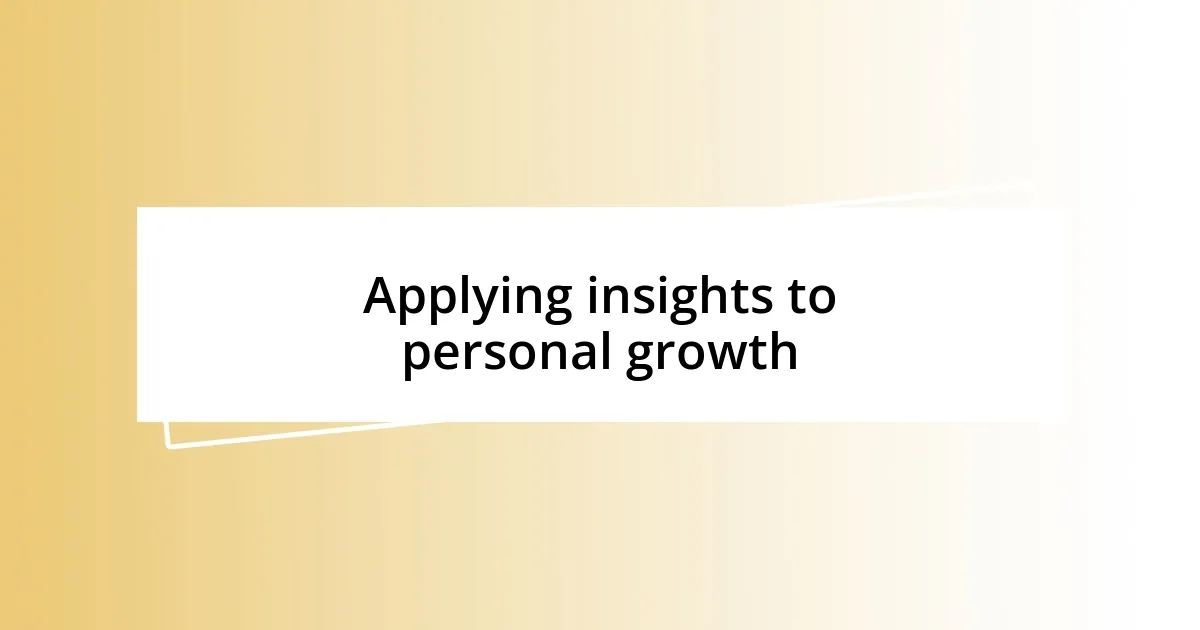
Applying insights to personal growth
When I reflect on the insights I’ve gained through mentorship, one stands out vividly: the importance of self-reflection. After a particularly enlightening discussion with my mentor about my career goals, I jotted down my thoughts in a journal. Going back to that entry months later, I was surprised at how my perspective had shifted and how much I had learned about myself. Have you ever written down your thoughts only to discover new layers of meaning later? This practice of revisiting my insights has become a crucial part of my personal growth.
Another valuable lesson I’ve learned is the application of insights to everyday situations. When my mentor shared her approach to decision-making, I began experimenting with it in my own life. For instance, she encouraged me to break down complicated problems into smaller, manageable tasks. I remember facing a challenging team project and applying that technique—it transformed my stress into a focused action plan, leading to a successful outcome. Have you ever tried applying someone else’s wisdom to your challenges? It’s incredible how these insights can fundamentally shift our approach and empower us in unexpected ways.
Lastly, embracing vulnerability has been key to my growth. I vividly recall a moment during a mentoring session when I admitted my fears about a public speaking event. Instead of brushing it off as a weakness, my mentor shared her own struggles with similar situations, highlighting that vulnerability can be a strength. That candid exchange created a deeper connection between us and encouraged me to approach my fear head-on. Isn’t it fascinating how sharing our challenges can ignite personal growth? By being open about our insecurities, we not only learn from others but also foster a supportive environment where everyone can thrive.












